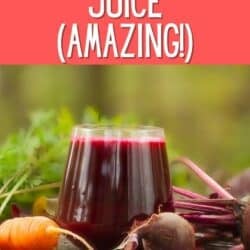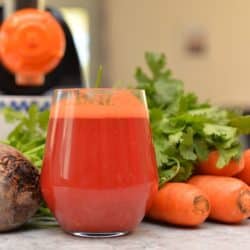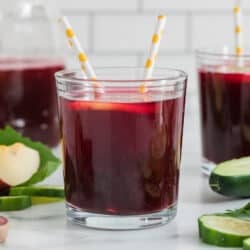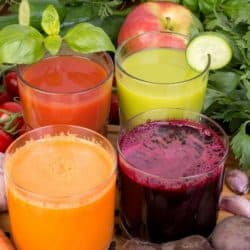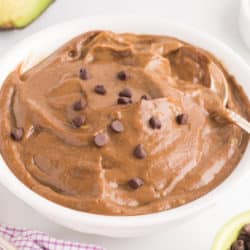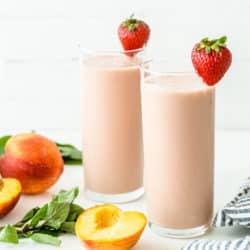9 Potential Health Benefits of Carrot Beetroot Juice
Carrot Beetroot Juice is a nutrient-dense drink that has several potential health benefits. Learn the benefits of Carrot Beet Juice including why you should drink it, how much to drink, and any precautions about adding this juice to your diet.
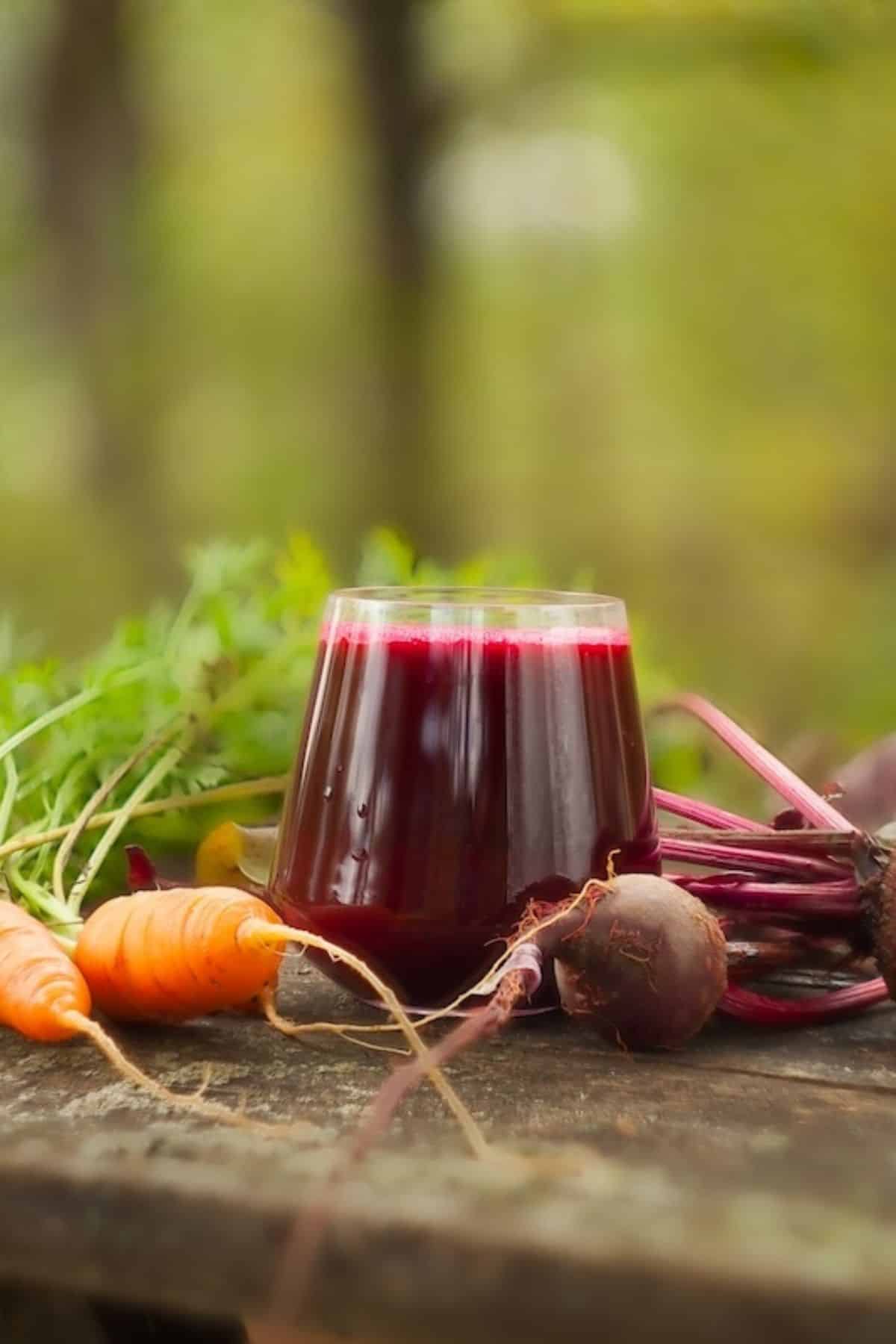
Potential Health Benefits
Carrot beetroot juice is a rich source of nutrients, packed with beta-carotene, a wide range of vitamins and minerals, and anti-inflammatory properties.
Enjoying it regularly can bring some considerable health benefits, from lowering your blood pressure to giving you clearer skin, healthy vision, and healthier hair. Some people consider it a miracle drink!
Let’s explore each in a little more detail. You may also like my related article on the benefits of drinking kale juice!
1. Inflammation Control
Inflammation is part of your body’s defense mechanism, helping fight off bacteria and heal injuries.
But chronic inflammation – when your body sends out inflammatory cells without the presence of bacteria or injury – is more problematic and is associated with a range of chronic diseases.
Beet carrot juice may be useful in bringing chronic inflammation under control. That’s because it contains lots of components that have been scientifically proven to help control inflammatory responses.
See all of my favorite beet juice recipes.
These include powerful antioxidants – compounds that neutralize free radicals that can damage cells – beta-carotene (which the body converts to vitamin A), nitrates, and compounds from the beets called betalains.
2. Detoxification
Adequate hydration is an important part of the detoxification process as it helps the body flush out toxins through the urine and keeps your kidneys functioning well. But the benefits of drinking carrot beet juice for detoxification go beyond simple hydration.
Beets contain a compound called betaine which helps support the health of the liver, while the high antioxidant content of the juice reduces oxidative stress throughout the body. This enables your body to process and eliminate toxins more effectively.
What’s more, beets are known to have an alkalizing effect, and studies show that this, too, can help your body excrete toxins very efficiently.
3. Better Digestion
While carrot beetroot juice doesn’t contain as much fiber as whole vegetables, some soluble fiber still remains. This adds bulk to your stools and promotes regular bowel movements, which is excellent for your digestive health.
Hydration plays a role here, too, keeping stools soft and cutting the risk of constipation, while the juice’s detoxification properties indirectly enhance digestion. That’s because you need a healthy liver to properly metabolize and digest nutrients
Finally, the digestive system benefits from the juice’s ability to control inflammation. This is important because even mild inflammation in the digestive tract can affect digestion and stop you from absorbing nutrients properly.
4. Lower Blood Pressure
Carrot beetroot juice is a good source of nitrate, which your body converts into nitric acid.
Nitric acid is a vasodilator – a substance that widens and relaxes the blood vessels, helping the blood circulate more freely. This helps reduce blood pressure and ensures that the body’s organs receive oxygen and nutrients more effectively.
The juice also contains lots of other heart-healthy compounds, including antioxidants, potassium, beta-carotene, and magnesium.
5. Weight Management
Although carrot beetroot juice has a lovely, sweet flavor, it’s pretty low in calories, with only around 62 per cup. It also contains some fiber, which helps you stay full for longer so you’re less tempted by unhealthy snacks between meals.
It helps keep you hydrated, too, which is another important factor in controlling those hunger pangs. What’s more, nutrients like potassium and magnesium in carrot beetroot juice help support a healthy metabolic system and metabolism, a crucial factor in preventing weight gain.
6. Controlling Blood Sugar
Surprisingly – considering their sweet taste – carrots have a low glycemic index rating, meaning they should be a safe choice if you’re watching your blood sugar levels.
Although beets rate moderately high on the glycemic index, their glycemic load – a measure of just how much they’ll impact your blood sugar – is low. This means that carrot beetroot juice releases sugar into the bloodstream slowly, regulating blood sugar levels and avoiding spikes.
Be sure to speak to your doctor about whether it’s safe for you to consume fresh juice.
7. Better Vision
Do you remember being told as a child that eating carrots would help you see in the dark? While not entirely true, carrots are certainly beneficial for your vision. This is thanks to their high beta-carotene content, which your body can at least partially convert to vitamin A.
Vitamin A has been shown to support eye health in many ways, potentially helping prevent night blindness and age-related macular decline. It also nourishes the cornea and helps your eyes produce the moisture they need to stay properly lubricated.
Carrot beetroot juice makes it easy to reap these benefits for good vision, especially if you don’t often consume carrots with your meals.
8. Healthier Skin and Hair
Carrot beetroot juice contains plenty of vitamin C and beta-carotene, both of which have been proven to benefit the health of your skin.
Drinking it regularly can help limit the effects of aging by boosting your defenses against UV radiation, keeping your skin properly hydrated, and contributing to a naturally healthy glow.
The condition of your hair may improve, too, as carrot beetroot juice is rich in the vitamins and minerals essential for hair health in addition to skin health.
9. Improved Athletic Performance
Last – but by no means least – carrot beetroot juice can give your exercise performance a significant boost.
That’s because of the high nitrate content I mentioned earlier, which not only controls your blood pressure but also improves circulation. This means that your muscles get all the nutrients and oxygen they need as you exercise, so your stamina increases.
As a bonus, nitrates have been shown to decrease the amount of oxygen your muscles actually need during athletic activity. This improves your endurance and your overall performance!
See my full article on the benefits of beet juice, especially in regards to nitric oxide and overall health.
How Much to Drink
There are no official recommendations for how much carrot beetroot juice you can drink, but an 8-ounce (1 cup) serving each day is usually ideal for most people. You may wish to start with a smaller amount, though, like 2-3 ounces.
Given all its benefits, it can be tempting to drink as much of this juice as possible. It’s important to remember, however, that it is relatively high in natural sugar and that moderation is key. It’s also important to make sure that you’re consuming plenty of fruits and vegetables in their whole form so you don’t miss out on their high fiber content.
Of course, the amount of juice that’s right for you will depend on your health and current diet. Speak to your healthcare provider for a personalized recommendation tailored to your needs
Precautions
Although drinking carrot beetroot juice in moderation is safe for most people, there are a couple of things to consider before enjoying it on a regular basis.
First, its high nitrate content means it might not be suitable if you have low blood pressure or are on blood pressure medication. This is because consuming nitrates can lower your blood pressure even more.
It is also quite high in oxalates – natural compounds that are especially abundant in beets. You might need to avoid these if you are prone to kidney stones.
Lastly, you may notice that your stool changes in color if you drink a lot of beet juice. You may be concerned if you see redness in your stool, so your doctor can help you rule out if it’s a result of drinking beet juice or not.
FAQs
Consuming vegetable juices like carrot beetroot juice regularly provides you with a range of important vitamins, minerals, and antioxidants. As a result, you may benefit from a more robust immune system, improved heart health and liver function, better digestion, and healthier hair and skin.
Consuming a wide variety of vegetable juices is a great way to give your nutritional intake a boost and can be part of a balanced diet. It provides you with a very diverse range of vitamins and minerals from all the different vegetables, but in a low-calorie form that won’t compromise your weight loss goals. What’s more, it gives you the option to enjoy vegetables outside of your main meal times and may encourage you to try vegetables that you wouldn’t have done otherwise. Finally, it’s convenient! It’s possible to prepare juices ahead of time for a healthy grab-and-go option on busy days.
There are a ton of recipes on the web. Most people like to make an ABC Juice which consists of juicing apple, beet, and carrots together. This ABC drink tastes delicious and is a great option as a starter beet juice.
Beet & Veggie Juice Recipes To Try
Summary
With a sweet taste and a vibrant color, carrot beetroot juice can be a wonderfully healthy addition to the diet for most people. It is a convenient and cost-effective way to enjoy these vegetables on a regular basis and to reap the many health benefits they provide.
Don’t forget to join my newsletter list to get exclusive clean eating recipes and tips. The newsletter is 100% free with no spam; unsubscribe anytime.
About the Author: Carrie Forrest has a master’s degree in public health with a specialty in nutrition and is a certified holistic nutritionist. She is a top wellness and food blogger with over 5 million annual visitors to her site. Carrie has an incredible story of recovery from chronic illness and is passionate about helping other women transform their health. Send her a message through her contact form.
Note: this post is for informational purposes only and is not intended as medical advice. Please consult your healthcare provider for recommendations related to your individual situation.


